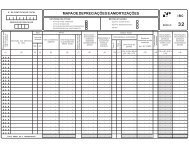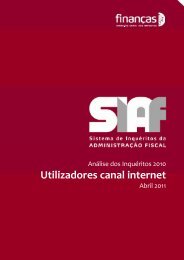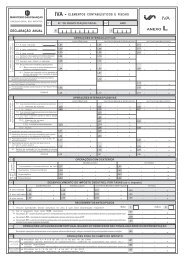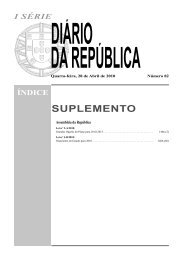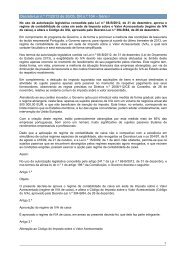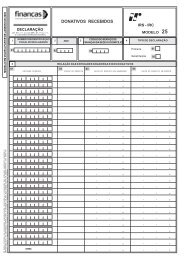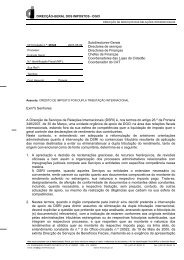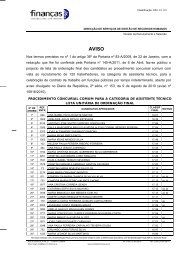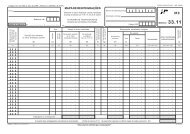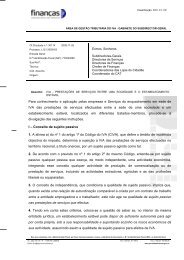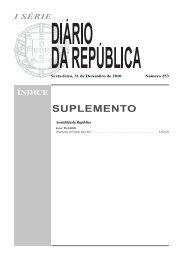Israel - Portal das Finanças
Israel - Portal das Finanças
Israel - Portal das Finanças
You also want an ePaper? Increase the reach of your titles
YUMPU automatically turns print PDFs into web optimized ePapers that Google loves.
522 Diário da República, 1.ª série — N.º 10 — 15 de Janeiro de 2008<br />
tracting State shall not be less favourably levied in that<br />
other State than the taxation levied on enterprises of that<br />
other State carrying on the same activities. This provision<br />
shall not be construed as obliging a Contracting State<br />
to grant to residents of the other Contracting State any<br />
personal allowances, relieves and reductions for taxation<br />
purposes on account of civil status or family responsibilities<br />
which it grants to its own residents.<br />
3 — Except where the provisions of paragraph 1 of article<br />
9, paragraph 7 of article 11, or paragraph 6 of article 12,<br />
apply, interest, royalties and other disbursements paid by an<br />
enterprise of a Contracting State to a resident of the other<br />
Contracting State shall, for the purpose of determining the<br />
taxable profits of such enterprise, be deductible under the<br />
same conditions as if they had been paid to a resident of<br />
the first-mentioned State.<br />
4 — Enterprises of a Contracting State, the capital of<br />
which is wholly or partly owned or controlled, directly or<br />
indirectly, by one or more residents of the other Contracting<br />
State, shall not be subjected in the first-mentioned State<br />
to any taxation or any requirement connected therewith<br />
which is other or more burden some than the taxation and<br />
connected requirements to which other similar enterprises<br />
of the first-mentioned State are or may be subjected.<br />
5 — The provisions of this article shall apply only to<br />
taxes covered by this Convention.<br />
Article 25<br />
Mutual agreement procedure<br />
1 — Where a person considers that the actions of one or<br />
both of the Contracting States result or will result for him<br />
in taxation not in accordance with the provisions of this<br />
Convention, he may, irrespective of the remedies provided<br />
by the domestic law of those States, present his case to<br />
the competent authority of the Contracting State of which<br />
he is a resident or, if his case comes under paragraph 1 of<br />
article 24, to that of the Contracting State of which he is<br />
a national. The case must be presented within three years<br />
from the first notification of the action resulting in taxation<br />
not in accordance with the provisions of the Convention.<br />
2 — The competent authority shall endeavour, if the<br />
objection appears to it to be justified and if it is not itself<br />
able to arrive at a satisfactory solution, to resolve the case<br />
by mutual agreement with the competent authority of the<br />
other Contracting State, with a view to the avoidance of<br />
taxation which is not in accordance with the Convention.<br />
Any agreement reached shall be implemented notwithstanding<br />
any time limits in the domestic law of the Contracting<br />
States.<br />
3 — The competent authorities of the Contracting States<br />
shall endeavour to resolve by mutual agreement any<br />
difficulties or doubts arising as to the interpretation or<br />
application of the Convention.<br />
4 — The competent authorities of the Contracting States<br />
may communicate with each other directly, including<br />
through a joint commission consisting of themselves<br />
or their representatives, for the purpose of reaching an<br />
agreement in the sense of the preceding paragraphs.<br />
Article 26<br />
Exchange of information<br />
1 — The competent authorities of the Contracting States<br />
shall exchange such information as is necessary for<br />
carrying out the provisions of this Convention or of the<br />
domestic laws of the Contracting States concerning taxes<br />
covered by this Convention insofar as the taxation thereunder<br />
is not contrary to this Convention. The exchange of<br />
information is not restricted by article 1. Any information<br />
received by a Contracting State shall be treated as secret<br />
in the same manner as information obtained under the<br />
domestic laws of that State and shall be disclosed only to<br />
persons or authorities (including courts and administrative<br />
bodies) concerned with the assessment or collection<br />
of, the enforcement or prosecution in respect of, or the<br />
determination of appeals in relation to, the taxes covered<br />
by the Convention. Such persons or authorities shall use<br />
the information only for such purposes. They may disclose<br />
the information in public courts proceedings or in judicial<br />
decisions.<br />
2 — In no case shall the provisions of paragraph 1 be<br />
construed so as to impose on a Contracting State the obligation:<br />
a) To carry out administrative measures at variance with<br />
the laws and administrative practice of that or of the other<br />
Contracting State;<br />
b) To supply information which is not obtainable under<br />
the laws or in the normal course of the administration of<br />
that or of the other Contracting State;<br />
c) To supply information which would disclose any<br />
trade, business, industrial, commercial or professional<br />
secret or trade process, or information, the disclosure of<br />
which would be contrary to public policy (ordre public).<br />
Article 27<br />
Members of diplomatic missions and consular posts<br />
Nothing in this Convention shall affect the fiscal privileges<br />
of members of diplomatic missions and consular<br />
posts under the general rules of international law or under<br />
the provisions of special agreements.<br />
CHAPTER VI<br />
Final provisions<br />
Article 28<br />
Entry into force<br />
1 — Each Contracting State shall notify the other, in<br />
writing, through diplomatic channels, the completion of<br />
the procedures required by its laws for the entering into<br />
force of this Convention. The Convention shall enter into<br />
force thirty days after the date of reception of the latter of<br />
these notifications.<br />
2 — The provisions of this Convention shall have<br />
effect:<br />
a) In respect of taxes withheld at source, thirty days after<br />
the date in which this Convention enters into force;<br />
b) In respect of other taxes, as to income arising in any<br />
fiscal year beginning on or after the first day of January of<br />
the year in which this Convention enters into force.<br />
Article 29<br />
Termination<br />
1 — This Convention shall remain in force until terminated<br />
by a Contracting State. Either Contracting State may



